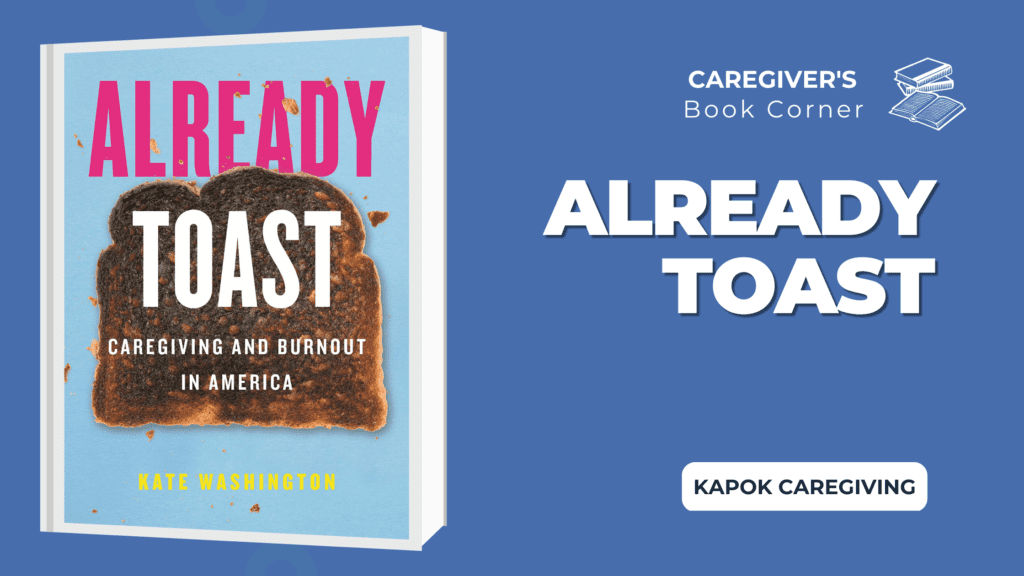
I’ve read countless books on caregiving over the years, not to mention looking at blog posts, podcasts, YouTube videos, and who knows what else.
Already Toast is one book that’s caught my eye recently. It gets many stellar reviews, so it seemed an excellent one to add to my collection. But, in this Already Toast review (if we can really call it that), I’ll show you why the book isn’t the right fit for most caregivers.
Why caregiving books anyway?
Well, when I was a caregiver myself, finding books was an important way of getting ideas and feeling less alone. There was always the hope that the right book or insight would solve a current problem and make life much easier.
Like most caregivers, I had little support, so had to rely on my own wits and learning to improve the situation.
While I’m no longer a caregiver, my writing for Kapok has kept me engaged on the topic. Here at Kapok, we’re determined to find whatever information, resources, and ideas we can that make the journey easier.
We can’t solve the challenges you face. Still, the right tools and insights can sometimes make a huge difference. So, let’s look at Already Toast and what it has to offer.
What Is Already Toast?
Already Toast itself was written by Kate Washington and has the tagline “caregiving and burnout in America”.
Already Toast is part memoir and part social commentary. The memoir aspect delves into Kate’s journey as a caregiver for her husband after his cancer diagnosis, while the social commentary looks at the state of caregiving in the United States, including statistics and details about the lack of support.
It’s an intense read in places, one that pulls no punches as Kate relays the various events in her life and the emotional challenges she’s faced.
My Already Toast Review

Already Toast could be a good book for people on the outside. It might be very relevant for friends or family who are watching someone providing care. In that context, the book offers valuable insight, as many caregiving challenges aren’t obvious to non-caregivers.
The book is relevant for policy makers too – and anyone interested in changing the system. Such change is urgently needed. The more people who understand the challenges caregivers face, the more likely this change is.
That said, the book is limited even in these situations, as Kate isn’t in a regular caregiving situation. She has more finances and a better support system than most family caregivers.
However, I need to be brutal here. Burnt Toast isn’t a good book for most caregivers.
Actually, it’s a pretty horrible book for caregivers, for a few different reasons.
My Problems with Already Toast
Kate’s Financial Position
This isn’t an issue with the book itself, but it’s relevant to other caregivers.
Basically, Kate and her husband are in a very good position from the get-go. They have enough financial resources to hire full-time caregivers regularly, sometimes having two, one of whom cooks meals for the family.
Kate’s in-laws are involved as well, helping to support their son and grandchildren. Kate even has the financial resources to regularly go on holidays when her husband is undergoing treatment.
Being in that type of position is like a dream to many family caregivers.
Seriously. Plenty of caregivers are struggling to make ends meet, can’t afford to pay a caregiver, and certainly can’t go on holiday. If you’re in this position, you might find Kate very difficult to connect with.
Kate’s Approach to Caregiving
A bigger issue is the author, Kate. I wanted to like her, truly, but it was incredibly difficult.
Her writing is filled with complaints from start to finish. She talks over and over again about how awful things are, sometimes without even acknowledging the simultaneous challenges her husband was facing.
This included complaining of boredom while her husband was going through serious treatments.
It’s a complaint-driven narrative that often lacks compassion.
That’s surprising as many caregivers are driven by compassion. They have plenty of angry moments, including the feeling that they have lost themselves within the role and resentment towards their loved ones, but such emotions often aren’t the whole experience.
This is particularly true if you’re caring for a husband or a wife – someone you chose to be with and who you love.
Even if your perspectives are similar to Kate’s, the book isn’t going to make anything better.
It’s likely to just entrench the negative views still further.
Doing so truly isn’t helpful and can easily make your caregiving experience much harder.
Kate’s Marriage and Expectations
Already Toast is pitched as a book about caregiving.
However, it’s also a book about Kate’s journey and her marriage.
As one reviewer pointed out, Kate clearly wasn’t happy with her marriage before her husband got sick. So, some of the anger and resentment that comes through on the pages comes from the intersection between caregiving and an unhappy marriage.
The journey might have been quite different if she were happy.
It seems that part of Kate’s challenge is that she had very strong expectations about her life and her marriage. An underlying theme is an expectation that marriage should be an equal partnership. She’s giving a lot, so it should be her turn to receive.
Unfortunately, as many of us know, the real world doesn’t always work like that. Marriage often isn’t this perfect 50/50 partnership, especially when injury or illness comes into play. Sometimes there’s no hope of ever returning to things as they were.
If you have strong expectations that don’t match reality, you’re going to keep suffering.
There are two main ways forward. One is to change the situation. The other is to work on changing your expectations. The best balance between these two will be influenced by your values and whether the situation is actually changeable.
Why I Suggest Avoiding Already Toast
The reason for writing this so-called Already Toast review is that the things you read and the people you listen to have a huge impact on your thinking and how you experience the world.
Think of it this way.
As humans, we are inherently storytellers. We experience life as a series of inputs, then our minds and emotions interpret these. That interpretation is partly based on our past, on our expectations and values, and also on what society has to say.
Reading books that continually emphasize the horrors of caregiving makes it difficult to see the experience any other way.
Now, don’t get me wrong.
Caregiving is tough. Pretending it’s not isn’t wise either. The role is hard and you need support.
The best books for caregivers are those that take a more balanced approach. Some recognize the challenges of the role and give you tools to help, while also helping you to find the good moments and stay connected with the person you’re supporting.
- The book The Conscious Caregiver is a good example here. This leans into the concept of mindfulness, looking at how you can use this in the caregiving role.
- I also recommend Setting Boundaries with Your Aging Parents by Allison Bottke. While that book isn’t perfect, it’s a fantastic introduction to ways that caregivers can set boundaries with love and compassion.
- One final example to consider is Take Back Your Life: A Caregiver’s Guide to Finding Freedom in the Midst of Overwhelm. Notably, this book focuses on finding yourself, your strength, and support while you’re still actively providing care.
Can you see the pattern?
None of these books get stuck in the overwhelm of caregiving, but they don’t deny it either. They teach you how to find your feet, rather than simply complaining that the role is difficult.
Such perspectives are much better for your mental health than Already Toast could ever be.
Related Post: How to Survive Spouse Caregiver Loneliness
Final Thoughts
In some senses, I get where Kate is coming from.
Caregiving can be pretty unforgiving and there’s minimal support out there. It would also be a particularly difficult road for a wife who had many hopes and expectations from her marriage.
I’m sure that many caregivers have thought or felt the same way that Kate does in moments.
And, as I mentioned before, caregiving can get pretty overwhelming. I’ve been in that boat too. There were days where I didn’t know how I would keep going or even whether I wanted to.
If you find things overwhelming and need to vent, which we all do on occasion, caregiving forums are a great place. These give you the chance to connect with other people in a similar situation, share your challenges, and look for solutions.
The problem is that the entire book reads this way and the good moments are hard to find.
If you’re going to walk a hard road, like caregiving, you have the choice of whether to look for the worst in it or to try and find the best.
I won’t lie. Looking for the positive in the middle of an incontinence disaster when you’re changing the sheets at 2 am while being completely exhausted is almost outright impossible.
But, cherished moments do still happen. There are little good things in every journey.
These can be a lifeline.
If you’re not sure where to begin, try Russ Harris’s book: The Reality Slap.
This isn’t a caregiving book. Instead, it’s a straightforward self-help book that focuses on how to do well even in midst of a crisis. The book focuses on short-term crises, rather than ongoing ones like caregiving, but there is some mention of longer-term issues and the same principles apply.
While the book won’t be for everyone, I find that it’s a fantastic initial tool for changing your thinking and starting to see the world in a better way.
After all, if caregiving is a role that you can’t escape right now, why not look for anything that can improve your experience of it?
Feeling Overwhelmed?
Check out our Caregiving Consulting service for personalized support and guidance.

Thank you for articulating what I was feeling when I read this book!